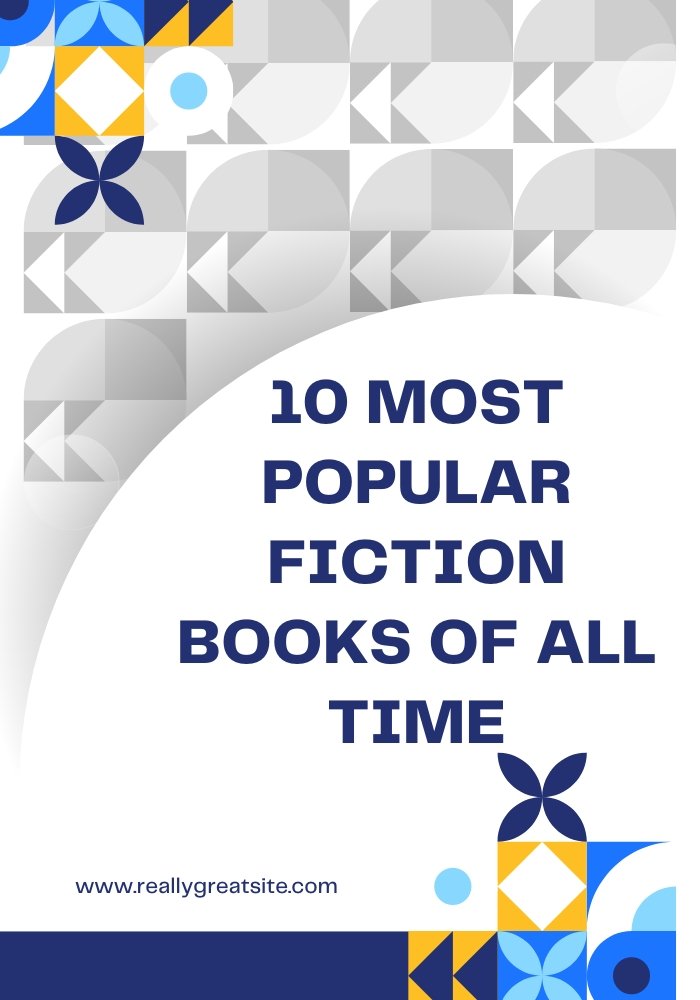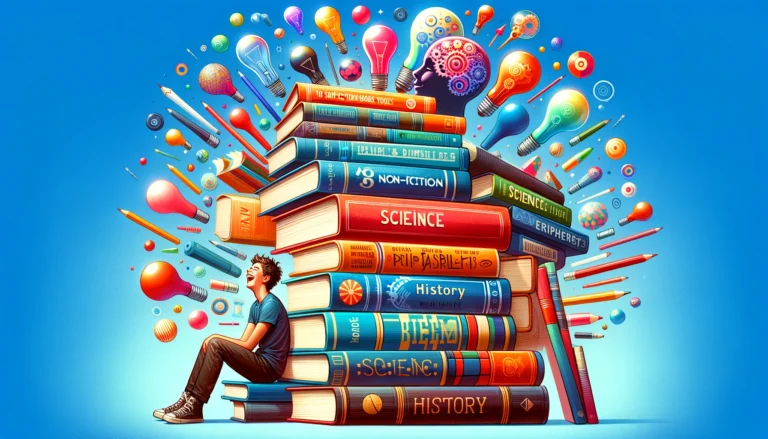Introduction:
Life’s challenges can be overwhelming, whether you’re dealing with relationship troubles, job uncertainties, or money problems. When you need guidance, the right book can be a valuable resource. We’ve selected 10 outstanding nonfiction works that offer practical advice and inspiration for those facing difficult times. These books provide insights from experienced authors who have overcome similar obstacles. They offer strategies to help you tackle your problems head-on and develop resilience. While no book can solve all your issues, these selections can equip you with new perspectives and tools to address your concerns. From improving your mindset to developing practical skills, each book on our list has something unique to offer. Let’s explore these powerful reads that can help you navigate life’s hurdles and work towards personal growth.
1. “Man’s Search for Meaning” by Viktor E. Frankl:

Viktor Frankl’s book, based on his experiences as a Holocaust survivor, offers a unique perspective on finding purpose in difficult circumstances. Frankl introduces logotherapy, a psychological approach that emphasizes the importance of meaning in one’s life. He argues that those who maintained a sense of purpose were more likely to survive extreme hardship. The book provides examples of how prisoners found small moments of meaning, even in concentration camps. Frankl’s ideas can be applied to less extreme situations, helping readers reframe their own challenges. While some may find his optimistic view challenging to accept, his insights on human resilience are thought-provoking. The book’s strength lies in its combination of personal narrative and psychological theory, though some readers might find certain sections repetitive.
2. “The Power of Now” by Eckhart Tolle:

Eckhart Tolle’s book focuses on the concept of living in the present moment as a way to reduce anxiety and find inner peace. Tolle argues that most human suffering stems from dwelling on past events or worrying about the future. He provides practical exercises to help readers become more aware of their thoughts and emotions. For example, he suggests observing one’s breath or paying close attention to physical sensations as ways to anchor oneself in the present. While some readers find Tolle’s ideas life-changing, others might struggle with the abstract nature of his concepts. The book’s strength lies in its accessible explanation of complex spiritual ideas, though some may find his writing style repetitive at times. Tolle’s approach can be particularly helpful for those dealing with stress or overthinking, but it may not resonate with readers seeking more concrete problem-solving strategies.
3. “Awaken the Giant Within” by Tony Robbins:

Tony Robbins’ book offers strategies for personal development, covering topics like emotion management, physical health, relationships, and finances. He introduces concepts such as “Neuro-Associative Conditioning” to change habits and the “Six Human Needs” theory to understand motivation. Robbins provides exercises like goal-setting and visualizations to help readers take action. His writing style is direct and enthusiastic, which some find motivating while others may find overwhelming. The book’s strength lies in its practical approach to self-improvement, with clear steps for implementation. However, critics argue that some of Robbins’ claims lack scientific backing. Additionally, his one-size-fits-all approach may not suit everyone’s needs. Despite these limitations, many readers find value in Robbins’ actionable advice and positive outlook on personal growth.
4. “The Road Less Traveled” by M. Scott Peck:

M. Scott Peck’s book explores personal growth through a blend of psychology and spirituality. He introduces the concept of “delaying gratification” as a key to maturity and discusses how facing problems head-on leads to personal development. Peck challenges common misconceptions about love, arguing that it’s an action rather than a feeling. He also examines the role of discipline in mental health. The book’s strength lies in its frank discussion of life’s challenges and practical advice for overcoming them. However, some readers might find Peck’s writing style dense or his religious references off-putting. His ideas about mental illness have also faced criticism from some mental health professionals. Despite these potential drawbacks, many readers appreciate Peck’s honest approach to self-improvement and his insights into human behavior.
5. “Mindset: The New Psychology of Success” by Carol S. Dweck:

Carol Dweck’s book introduces the concepts of fixed and growth mindsets, explaining how our beliefs about our abilities affect our success. She presents research showing that people who believe they can improve their skills through effort tend to achieve more than those who view their abilities as static. Dweck provides examples from education, sports, and business to illustrate her points. For instance, she discusses how praising children for effort rather than intelligence can foster resilience. While many readers find the concept enlightening, some critics argue that the book oversimplifies complex psychological processes. Additionally, the repetitive nature of some sections may frustrate certain readers. Despite these potential drawbacks, Dweck’s work offers valuable insights into motivation and personal development, particularly for educators and parents.
6. “The Obstacle Is the Way” by Ryan Holiday:

Ryan Holiday’s book applies ancient Stoic principles to modern challenges. He argues that obstacles can be reframed as opportunities for growth and success. Holiday uses historical examples, such as Ulysses S. Grant’s military strategies, to illustrate his points. The book is divided into three main sections: perception, action, and will. Holiday offers practical advice, like focusing on what you can control and taking decisive action in difficult situations. While many readers find the book motivating, some critics argue that it oversimplifies complex philosophical ideas. Additionally, the repetitive nature of certain concepts may not appeal to all readers. Despite these potential drawbacks, Holiday’s work provides a fresh perspective on dealing with adversity, particularly valuable for those facing professional or personal challenges.
7. “Grit: The Power of Passion and Perseverance” by Angela Duckworth:

“Grit: The Power of Passion and Perseverance” by Angela Duckworth:
Angela Duckworth’s book explores the idea that persistence and passion are key factors in achieving long-term goals. She introduces the concept of “grit” and presents research suggesting it’s more important than talent in predicting success. Duckworth uses examples from various fields, such as West Point cadets and National Spelling Bee contestants, to support her arguments. The book offers strategies for developing grit, including the “growth mindset” approach. While many readers find Duckworth’s ideas inspiring, some critics argue that the book oversimplifies success and underplays the role of external factors. Additionally, the repetitive nature of certain sections may not engage all readers. Despite these potential drawbacks, “Grit” provides valuable insights into motivation and achievement, particularly for educators and parents.
8. “The Alchemist” by Paulo Coelho:

Paulo Coelho’s novel follows Santiago, a shepherd who embarks on a journey to find treasure. The story explores themes of personal growth and destiny. Coelho uses simple language and allegory to convey his ideas about pursuing one’s goals. For example, he introduces the concept of “Personal Legend” to represent one’s true calling. The book’s strength lies in its accessible philosophy and universal message. However, some readers might find the plot predictable or the lessons overly simplistic. Critics argue that the book romanticizes the pursuit of dreams without addressing real-world obstacles. Despite these potential drawbacks, many readers appreciate Coelho’s optimistic perspective and find inspiration in Santiago’s journey. The book’s blend of adventure and philosophy appeals particularly to those seeking motivation or contemplating life changes.
9. “Outliers: The Story of Success” by Malcolm Gladwell:

Malcolm Gladwell’s “Outliers” explores the hidden factors that contribute to high levels of success. Through engaging narratives, Gladwell examines the impact of culture, timing, upbringing, and luck, challenging the traditional notion of the “self-made” individual. His insightful analysis and thought-provoking conclusions stimulate intellectual curiosity, urging readers to look beyond individual effort to understand success in a broader context. “Outliers” is an invitation to reflect on our own stories and the myriad external influences that shape them. Gladwell’s work encourages a deeper understanding of success and a greater appreciation for the complex interplay of factors that lead to extraordinary achievements.
10. “Daring Greatly” by Brené Brown:

Brené Brown’s “Daring Greatly” is a powerful exploration of vulnerability as the cornerstone of courage, connection, and creativity. Drawing on extensive research, Brown debunks the myth that vulnerability is a weakness, showing instead that it is our greatest measure of courage. Her engaging and empathetic writing encourages readers to embrace vulnerability, to show up and be seen, even when there are no guarantees. This book is a call to action to live wholeheartedly, to love freely, and to dare greatly. Brown’s insights inspire readers to engage with life fully, to face struggles with courage, and to transform vulnerability into strength.
Conclusion:
The journey through these 10 best nonfiction books for strugglers is akin to navigating a labyrinth, where each turn reveals new wisdom, insights, and strategies for overcoming life’s challenges. From the depths of human suffering to the heights of success, these books span a broad spectrum of human experience, offering guidance, hope, and inspiration every step of the way. They teach us that struggle is not an obstacle to success but a necessary part of the journey, that courage, resilience, and perseverance are virtues forged in the fire of adversity. By embracing the lessons contained within these pages, you can emerge from your struggles not just unscathed, but stronger, wiser, and more connected to the core of who you are. Let these books be your companions, your guides, and your mentors as you navigate the complexities of life. The path to overcoming struggle may not be easy, but with these 10 books lighting the way, you have everything you need to change your life.






